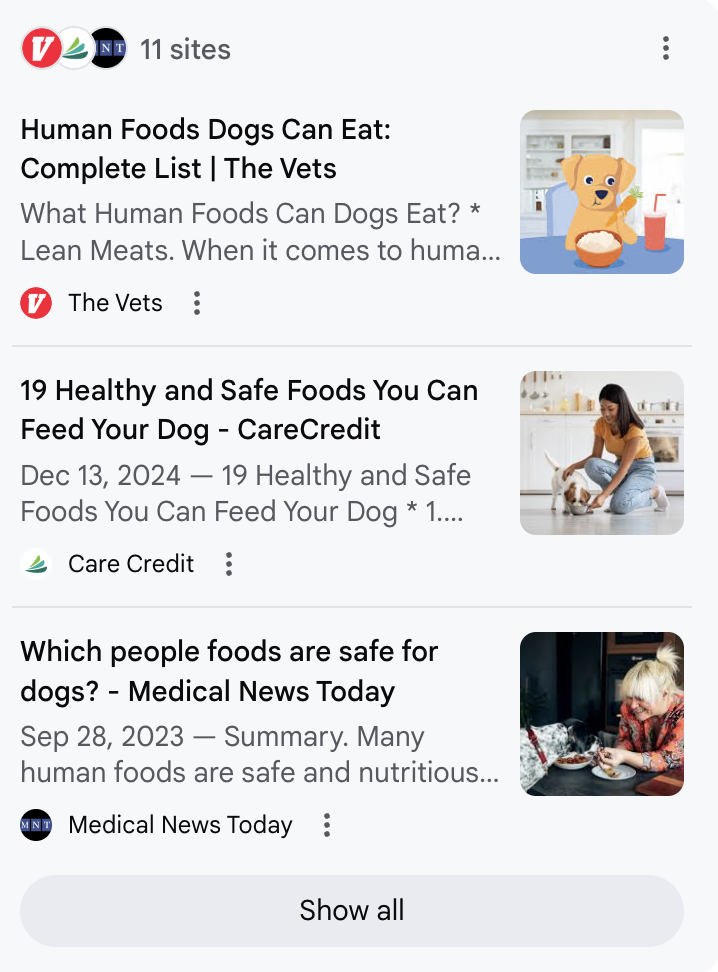
Can dogs have? Top 150 questions.
Written for Medical Realities by Getter Rob on September 11, 2025

What Dogs Can and Can’t Eat (and how it actually affects them)
Big picture
Dogs are omnivores, but they’re not tiny humans in fur coats. Some people foods (especially certain fruits and veggies) make great, low-calorie treats. Others can trigger vomiting, diarrhea, pancreatitis, or even organ failure. When in doubt, keep it simple, keep portions small, and call your vet if something seems off.
Fruits & veggies that are usually safe for dogs
Serve plain, fresh or frozen, and always wash, de-seed, and cut into bite-size pieces.
- Apples (no seeds/core), pears (no seeds/core): fiber + vitamin C. Great crunchy treat for breath.
- Blueberries, strawberries, raspberries (small handful): antioxidant boost; raspberries in moderation (they contain natural xylitol).
- Banana (a few slices): potassium and B-vitamins; higher sugar, so go easy.
- Watermelon (no rind/seeds), cantaloupe, mango (no pit/skin), pineapple (fresh small chunks): hydrating, vitamin A/C; watch the sugar.
- Cucumber, zucchini, green beans, carrots, celery: low-cal crunch, nice for weight control.
- Pumpkin/sweet potato (plain, cooked, no spices): gentle fiber for stool quality.
These are the go-tos when folks search “fruits safe for dogs” or “can dogs eat fruit”—small, simple portions keep tummy drama to a minimum.
Foods to never give your dog
This is the “foods toxic to dogs” list—don’t test it.
- Grapes/raisins: can cause sudden kidney failure (even one can be dangerous).
- Chocolate/cocoa, coffee, tea, energy drinks: stimulants + theobromine—heart and neuro risks.
- Xylitol (birch sugar) in sugar-free gum, candy, peanut butter, baked goods: causes severe hypoglycemia and liver failure.
- Onions, garlic, chives, leeks (raw, cooked, powders): can damage red blood cells → anemia.
- Alcohol, cannabis/THC edibles, raw bread dough: serious emergencies.
- Macadamia nuts, black walnuts: neuro + GI signs.
- Avocado (large amounts), pits/seeds/cores of any fruit: choking + toxins in some pits.
- Salt, fatty scraps, highly seasoned foods: pancreatitis risk.
Foods that are “sometimes” or “a little, carefully”
- Dairy (plain yogurt, cottage cheese, small bits of cheese): OK for some, but many dogs are lactose-intolerant. Start tiny.
- Peanut butter: choose plain, no xylitol, give small amounts (high calorie).
- Broccoli, cauliflower, cabbage, Brussels sprouts: a few florets only—gassy.
- Tomatoes: ripe fruit in tiny amounts may be okay; avoid green parts (solanine).
- Coconut/coconut oil: small tastes are usually fine; lots of fat = loose stool for some pups.
How much is a “treat-size” portion?
Use the 10% rule: treats (including fruits/veggies) should be ≤10% of daily calories.
Quick guide:
- Mini dogs (≤10 lb): 1–2 tsp fruit/veg at a time
- 20–50 lb: 1–3 Tbsp
- 50+ lb: ¼–½ cup
Introduce one new food at a time so you can spot what does or doesn’t agree with your dog.
Puppies, seniors, and special cases
- Puppies have sensitive guts—keep new foods tiny and infrequent.
- Dogs with diabetes, kidney disease, pancreatitis, food allergies, or on special prescription diets: talk to your vet before adding anything—even “healthy” snacks can backfire.
- Bones: skip cooked bones (splinter risk). Raw meaty bones carry pathogen and tooth-fracture risks—only under a vet’s guidance.
Can dogs have strawberries?
Small amounts are fine—wash, remove the stem, and slice. They’re rich in vitamin C and fiber but a bit sugary, so keep it to a few pieces as a treat.
Can dogs have bananas?
Yes, in moderation. Bananas are potassium-packed but high in sugar; use thin slices as an occasional reward, not a daily snack.
Can dogs have blueberries?
Absolutely—blueberries are a top-tier dog treat. They’re bite-sized antioxidants that support brain and immune health; a small handful is plenty.
Can dogs have watermelon?
Yes, seedless and rind-free only. It’s super hydrating and low-cal, perfect for hot days—serve in small cubes or frozen bites.
Can dogs have cinnamon?
A tiny sprinkle of true cinnamon (Ceylon) is generally safe, but don’t feed sticks, essential oils, or baked goods loaded with sugar. If your dog has liver issues or is on meds, skip it.
Can dogs have pineapple?
Yes, a few peeled, cored chunks. Pineapple brings vitamins and enzymes but also natural sugars, so keep portions small to avoid tummy upset.
Can dogs have apples?
Yes—slice and remove core and seeds. Apples offer fiber and crunch for dental enrichment; avoid sugary apple desserts.
Can dogs have tomatoes?
Only small amounts of ripe red tomato flesh. Avoid green tomatoes and all leaves/stems (they contain solanine) which can upset the GI tract.
Can dogs have cucumbers?
Yes—great low-cal crunch. Peel if your dog has a sensitive stomach and serve bite-size to prevent choking.
Can dogs have honey?
A tiny lick is okay for healthy adult dogs, but it’s pure sugar—skip for diabetic or overweight pups and never give raw honey to immunocompromised dogs.
Can dogs have oranges?
Yes, in small peeled, seedless segments. They’re acidic and sugary, so start with one or two pieces to see how your dog handles it.
Can dogs have avocado?
Best to avoid. Avocado can contain persin (toxic for some animals), is high in fat, and the pit is a choking hazard.
Can dogs have broccoli?
In tiny amounts—lightly steamed florets only. Too much can cause gas and GI irritation; keep it under ~10% of daily calories.
Can dogs have celery?
Yes—crisp, low-cal, and hydrating. Cut into small pieces to prevent choking and avoid stringy chunks for toy breeds.
Can dogs have grapes?
No—ever. Grapes and raisins can cause sudden kidney failure even in tiny amounts; call your vet immediately if ingested.
Can dogs have mango?
Yes, peeled and pitted, in small cubes. It’s sweet and fibrous—great as an occasional treat, but the pit is dangerous and contains trace cyanide.
Can dogs have cantaloupe?
Yes, in seedless, rind-free chunks. Hydrating and vitamin-rich, but still sugary—serve modest portions.
Can dogs have pistachios?
Not recommended. Salted nuts are a no-go, pistachios are fatty (pancreatitis risk), and moldy nuts can carry aflatoxins; choose safer treats.
Can dogs have popcorn?
Plain, air-popped popcorn (no butter, salt, or toppings) can be an occasional snack. Remove unpopped kernels to avoid cracked teeth or choking.
Can dogs have raspberries?
Yes, in tiny amounts. Raspberries have fiber and antioxidants, but they also contain small amounts of xylitol—keep it to a few berries only.
Can dogs have almonds?
Better not. Almonds are hard to digest, can cause GI upset, and the salted/seasoned kind is a no-go.
Can dogs have blackberries?
Yes—fresh or frozen blackberries make a solid, low-cal treat. A few berries are plenty for most pups.
Can dogs have carrots?
Absolutely. Crunchy, low-cal, and great for enrichment; serve baby carrots or thin slices to avoid choking.
Can dogs have shrimp?
Yes, cooked plain (no butter, garlic, or seasoning) with shell and tail removed. A couple of bite-size pieces is plenty.
Can dogs have cashews?
Occasionally, unsalted and plain. They’re fatty, so keep portions tiny to avoid tummy upset or pancreatitis risk.
Can dogs have cheese?
Small amounts are okay for most dogs. Choose low-fat, low-sodium options and skip if your dog is lactose-sensitive.
Can dogs have cherries?
Avoid. The pits and stems contain cyanide and are choking hazards; even the flesh can be more trouble than it’s worth.
Can dogs have corn?
Cooked corn off the cob is fine. Never let dogs gnaw the cob—it’s a major choking/obstruction risk.
Can dogs have eggs?
Yes—cooked eggs (scrambled or hard-boiled, no butter/salt) are protein-rich. Skip raw eggs due to bacteria and biotin issues.
Can dogs have garlic?
No. Garlic (fresh, powdered, cooked) can damage red blood cells and cause anemia.
Can dogs have mushrooms?
Only plain store-bought mushrooms in tiny amounts; many wild mushrooms are toxic. When in doubt, skip it.
Can dogs have onions?
Hard no. Onions (all forms) can cause dangerous anemia—even small amounts.
Can dogs have peaches?
Yes, in small slices with pit and tough skin removed. Never canned in syrup and keep portions modest.
Can dogs have peanuts?
Plain, unsalted peanuts are okay in small amounts. Avoid honey-roasted, salted, or xylitol-sweetened peanut products.
Can dogs have pickles?
Not recommended. Pickles are high in salt and spices that can upset your dog’s stomach.
Can dogs have coconut?
A little unsweetened coconut meat is usually fine, but it’s rich—go easy. Avoid sweetened flakes and coconut products with additives.
Can dogs have green beans?
Yes—fresh, steamed, or frozen (no salt). Great low-cal snack many vets use in weight-management plans.
Can dogs have kiwi?
In small, peeled pieces only. Kiwi is tangy and fibrous—go slow to avoid belly upset.
Can dogs have marshmallows?
Skip them. They’re basically sugar and some brands use xylitol, which is toxic to dogs.
Can dogs have milk?
Most adult dogs are lactose-intolerant. A lick likely won’t harm, but regular servings can cause diarrhea and gas.
Can dogs have pears?
Yes—ripe, cored, and sliced. Remove all seeds (trace cyanide) and keep portions small due to sugar.
Can dogs have peas?
Plain green peas are fine in moderation. Avoid canned with added salt and skip pea pods that are tough/stringy.
Can dogs have potatoes?
Only cooked plain (baked/boiled), no butter or seasoning. Never feed raw or green potatoes due to solanine.
Can dogs have sweet potatoes?
Yes—cooked and mashed or in soft cubes. Nutritious and generally easy on the stomach when served plain.
Can dogs have asparagus?
Not ideal. It’s tough and stringy; if you offer it, cook lightly and cut into tiny pieces—but there are better veggie options.
Can dogs have autism?
Dogs don’t get “autism” like humans, but some have neurodivergent-like traits (sensory sensitivity, repetitive behaviors). A vet or behaviorist can help with evaluation and support.
Can dogs have bell peppers?
Yes—red, yellow, or green in small slices. They’re vitamin-rich; avoid spicy peppers entirely.
Can dogs have Benadryl?
Only under vet guidance. Some vets use diphenhydramine for allergies or mild motion sickness, but dosing and safety depend on your dog’s health and meds.
Can dogs have cottage cheese?
In small amounts if your dog tolerates dairy. Choose low-fat, unseasoned cottage cheese as a protein topper—not a main meal.
Can dogs have cranberries?
Yes, in small amounts. Fresh or frozen cranberries are fine as a tart, fiber-rich treat—skip sugary cranberry sauces and juice blends.
Can dogs have ham?
Best to avoid. Ham is salty and fatty, which can upset stomachs and raise pancreatitis risk.
Can dogs have olives?
Plain, pitted olives in tiny quantities are usually okay, but they’re salty—avoid stuffed, spiced, or brined varieties.
Can dogs have spinach?
A few cooked, chopped leaves are fine, but spinach contains oxalates; keep portions small and skip it for dogs with kidney issues.
Can dogs have tuna?
Occasionally, in small amounts and packed in water (no salt or oil). Tuna can be high in mercury—don’t make it a staple.
Can dogs have turkey?
Yes, plain cooked turkey (no skin, bones, garlic, or onions). Great lean protein in modest portions.
Can dogs have bacon?
Not recommended. Super fatty and salty—easy route to tummy upset and pancreatitis.
Can dogs have cauliflower?
Yes, steamed or raw in bite-size pieces. Start slow—cruciferous veggies can cause gas.
Can dogs have Greek yogurt?
Plain, unsweetened Greek yogurt can be a protein-rich topper if your dog tolerates dairy. Avoid added sugar or xylitol.
Can dogs have olive oil?
A drizzle (¼–½ tsp for small dogs, up to 1 tsp for large) can help coat and skin. Too much = diarrhea.
Can dogs have rice?
Plain white or brown rice (cooked) is fine and often used for bland diets. Keep servings modest due to carbs.
Can dogs have walnuts?
Skip them. Regular walnuts can cause GI upset; moldy nuts risk tremors. Black walnuts are toxic.
Can dogs have yogurt?
Plain, unsweetened yogurt in small amounts is okay for many dogs. Avoid flavors and anything with xylitol.
Can dogs have banana?
Yes—soft, easy snack with potassium and fiber. Go easy; bananas are sugary.
Can dogs have Down syndrome?
Dogs don’t get human Down syndrome. They can have congenital or neurological conditions that look similar—your vet can assess.
Can dogs have ginger?
In tiny amounts, fresh ginger can help mild nausea. Too much can irritate the gut—ask your vet before using regularly.
Can dogs have ibuprofen?
No—ibuprofen is toxic to dogs and can cause ulcers and kidney failure. Call your vet immediately if ingested.
Can dogs have lettuce?
Yes—crisp lettuces like romaine or iceberg are safe but mostly water. Chop small to prevent choking.
Can dogs have peanut butter?
Yes, if it’s plain and xylitol-free. It’s calorie-dense—use a small smear for treats or pill-hiding.
Can dogs have pecans?
Avoid. Pecans can cause GI upset and sometimes contain molds that produce toxins.
Can dogs have pork?
Plain, well-cooked pork (no seasoning, no bones) can be okay in small amounts. Skip fatty cuts and cured pork.
Can dogs have pumpkin seeds?
Yes—plain, roasted, unsalted seeds in small amounts are a crunchy fiber boost.
Can dogs have raisins?
Absolutely not. Raisins (and grapes) can cause acute kidney failure—treat any ingestion as an emergency.
Can dogs have Tylenol?
No—acetaminophen can damage the liver and red blood cells. Emergency vet visit if swallowed.
Can dogs have zucchini?
Yes—raw or cooked, plain, and chopped small. Low-cal and dog-friendly.
Can dogs have beans?
Some cooked plain beans (green beans, black beans, kidney, chickpeas) are okay in small amounts. Avoid baked beans and added salt.
Can dogs have bread?
Plain white or whole-wheat bread is generally safe in tiny amounts. Avoid dough (dangerous) and flavored loaves (raisins, onions).
Can dogs have Brussels sprouts?
Yes, steamed and chopped. Nutritious but gassy—start with a small portion.
Can dogs have cabbage?
In moderation, cooked or raw and chopped. Like other crucifers, it can cause gas—ease in slowly.
Can dogs have coconut oil?
Maybe, in tiny amounts if your vet okays it. Some dogs tolerate a ¼–½ tsp as a topper; too much causes diarrhea.
Can dogs have melatonin?
Only with a vet’s guidance. Melatonin can help with anxiety or sleep in some dogs, but dosing matters and certain conditions/meds make it a no-go.
Can dogs have nuts?
Mostly skip them. A few plain peanuts or cashews are usually fine; avoid macadamias (toxic), walnut varieties (risk molds), and anything salted or candied.
Can dogs have peppers?
Bell peppers (red/green/yellow) are okay in small chopped pieces. Spicy peppers (jalapeño, chili) are a hard no—GI upset and eye/skin irritation.
Can dogs have Pepto Bismol?
Not unless your vet says so. Some formulas contain salicylates (aspirin-like) that can be risky; dosing is tricky.
Can dogs have pomegranate?
Best avoided. The seeds and tannins often cause tummy upset—tiny tastes only, if at all.
Can dogs have salmon?
Yes, if it’s fully cooked, boneless, and unseasoned. Great omega-3s; never feed raw salmon (parasite risk).
Can dogs have whipped cream?
A lick or two is usually fine for lactose-tolerant pups, but it’s sugary and fatty—keep it rare.
Can dogs have almond butter?
In tiny amounts, if it’s plain and xylitol-free. Calorie-dense and can upset sensitive stomachs.
Can dogs have applesauce?
Plain, unsweetened applesauce in spoonful portions is okay. Skip added sugar, spices, and anything with xylitol.
Can dogs have aspirin?
Only under a vet’s direction. Wrong dose can cause ulcers and bleeding; don’t DIY pain control.
Can dogs have avocados?
Better not. Persin in the fruit/peel/pit can cause GI upset; the pit is a choking hazard.
Can dogs have black pepper?
Avoid. It can irritate the mouth and gut—dogs don’t need seasoning.
Can dogs have chocolate?
No. Chocolate contains theobromine and caffeine, which are toxic to dogs—emergency if ingested.
Can dogs have cucumber?
Yes. Low-cal, hydrating crunch—serve peeled and chopped for easy nibbling.
Can dogs have dates?
A couple of pitted dates are generally safe, but very sugary—tiny treats only.
Can dogs have edamame?
Plain, cooked edamame (no pods, no salt) in small amounts is fine. Watch for soy sensitivities.
Can dogs have ice cream?
Not recommended. Lots of sugar and many dogs are lactose-intolerant—try dog-safe frozen yogurt alternatives.
Can dogs have lemon?
Skip it. Sour oils and citric compounds can irritate the stomach; most dogs dislike the taste anyway.
Can dogs have mandarin oranges?
A small seedless segment is usually okay. They’re sugary and acidic—offer sparingly, no peel.
Can dogs have mustard?
No. Mustard seeds can cause GI upset; avoid condiments.
Can dogs have oatmeal?
Yes—plain, cooked with water (no sugar, raisins, or spices). Good fiber; keep portions modest.
Can dogs have raw eggs?
Better to cook them. Raw eggs carry salmonella risk and avidin can interfere with biotin; cooked eggs are a safer protein boost.
Why can’t dogs have chocolate?
Chocolate’s theobromine and caffeine overstimulate the heart and nervous system—can lead to vomiting, seizures, even death.
Why can’t dogs have grapes?
Unknown toxin in grapes/raisins can cause sudden kidney failure—treat any ingestion as an emergency.
Can dogs have ADHD?
Dogs don’t get human ADHD, but they can show hyperactivity or attention issues—your vet or a trainer can help with behavior plans.
Can dogs have beets?
In small, cooked or finely shredded portions, beets are okay. May tint urine/stool—don’t panic.
Can dogs have black beans?
Yes—plain, cooked (no salt/onion/garlic). Add gradually to avoid gas.
Can dogs have brown rice?
Sure—plain, fully cooked brown rice is a fine carb topper. Keep servings small.
Can dogs have butter?
Best avoided. High fat with no real benefits—easy way to cause diarrhea or pancreatitis.
Can dogs have catnip?
Safe, but most dogs are indifferent. A few get mellow or a touch playful; it’s not harmful.
Can dogs have chia seeds?
Yes—in tiny amounts. Chia adds fiber and omega-3s, but too much can cause gas or tummy upset; soak first and sprinkle lightly.
Can dogs have chickpeas?
Plain, cooked chickpeas are fine in small portions. Skip canned with salt and any hummus (garlic/onion risk).
Can dogs have coconut water?
A few sips are usually okay, but it’s sugary and high in potassium—offer sparingly and avoid for kidney/heart issues.
Can dogs have cream cheese?
Not ideal. Many dogs are lactose-sensitive and it’s high in fat—use only as a tiny “pill pocket,” if at all.
Can dogs have honeydew?
Yes, in seedless, rind-free cubes. Hydrating and sweet—moderation is key due to sugar.
Can dogs have lemons?
Nope. Citrus oils/acids can irritate the gut; most pups hate the taste anyway.
Can dogs have mangos?
Yes—peeled and pitted. Sweet and vitamin-rich; keep portions small because of sugar.
Can dogs have onion?
No. Any form (raw, cooked, powder) can damage red blood cells and cause anemia.
Can dogs have peppermint?
Fresh mint leaves (spearmint/peppermint) in tiny bits are usually fine; avoid essential oils, candies, and xylitol.
Can dogs have pepperoni?
Skip it. Spicy, salty, fatty—triple whammy for GI upset and pancreatitis risk.
Can dogs have plums?
Only the flesh and only a little. Remove pit/skin; the pit is a choking hazard and contains toxins.
Can dogs have pretzels?
Better not. Refined carbs and salt with no real nutrition—choose dog treats instead.
Can dogs have quinoa?
Yes—plain, well-rinsed, fully cooked. Start with small spoonfuls to avoid gas.
Can dogs have rib bones?
No. Cooked bones splinter; raw beef/pork ribs also pose fracture and bacterial risks—avoid bones altogether.
Can dogs have rosemary?
Fresh rosemary as a pinch of seasoning is typically safe; avoid concentrated oils/extracts.
Can dogs have seaweed?
Plain, unseasoned nori in tiny pieces is okay. Never let dogs eat dried seaweed off beaches (salt/swell risk).
Can dogs have squash?
Yes. Cooked butternut/yellow squash (no seeds/skin) is gentle fiber and vitamins—serve plain.
Can dogs have sweet potato?
Yes—cooked, plain, and mashed or cubed. Nutritious fiber; don’t feed raw.
Can dogs have turmeric?
A pinch may be okay, but dosing matters and can interact with meds—ask your vet before using.
Can dogs have vanilla ice cream?
Not recommended. Sugar and lactose can upset bellies—choose dog-safe frozen yogurt alternatives.
Can dogs have watermelon rind?
No. Tough rind can cause GI upset or blockages; feed only seedless red flesh.
Can dogs have white chocolate?
Safer than dark but still not a treat—fat/sugar bomb and can contain additives; avoid all chocolate.
Can dogs have almond milk?
Unsweetened, xylitol-free almond milk in small sips is usually fine; many flavored milks contain sugar or xylitol—read labels.
Can dogs have apple?
Yes—slice and remove seeds/core. Crisp fiber snack; great training bites.
Can dogs have avocado oil?
A tiny drizzle is generally safe, but unnecessary calories; avoid fruit/peel/pit of avocado.
Can dogs have black olives?
Plain, pitted, unsalted olives are okay in very small amounts; avoid brined/seasoned varieties.
Can dogs have butternut squash?
Yes—peeled, seeded, cooked, and plain. Gentle on stomachs and nutrient-dense.
Can dogs have chicken broth?
Homemade, no-salt broth is great for picky eaters or hydration. Avoid onions, garlic, and store brands high in sodium.
Can dogs have coffee?
Absolutely not. Caffeine is toxic to dogs—no sips, no grounds, no beans.
Can dogs have dragon fruit?
Yes—in peeled, seedless chunks. Mild, hydrating fruit; keep portions small.
Can dogs have fish?
Yes—fully cooked, boneless, and unseasoned fish like salmon, cod, or tilapia. Avoid heavy-mercury species and raw prep.
Can dogs have green apples?
Sure—same rules as red: seedless, cored slices. A bit more tart, still a solid fiber snack.
Can dogs have green peppers?
Yes. Bell peppers (any color) in small chopped pieces are crunchy, low-cal treats.
Can dogs have ham bones?
No—cooked, smoked bones splinter and are salty/greasy. Dangerous for teeth and guts.
Can dogs have hot dogs?
Not ideal. Processed, salty, fatty—if you must, offer a tiny piece of an all-beef, low-sodium dog with no onion/garlic.
Can dogs have nectarines?
Small amounts of flesh only. Remove pit/skin; high sugar so keep it occasional.
Can dogs have nightmares?
Dogs can dream and show fear responses in sleep. Gentle wake-ups and calming routines help; ask your vet if it’s frequent.
Can dogs have papaya?
Yes—peeled, seeded chunks. Digestive enzymes and fiber are nice; just don’t overdo the sugar.
Can dogs have Pedialyte?
Only with vet guidance. Some formulas/conditions make it risky; don’t DIY dehydration treatment.
Can dogs have periods?
Intact female dogs go into heat about twice a year, not “periods” like humans. Consider spaying—talk to your vet.
Can dogs have pork bones?
No—splinter risk and bacterial concerns. Choose vet-approved chew alternatives.
Can dogs have pumpkin?
Yes—plain canned pumpkin (not pie filling) supports digestion. Start with a spoonful.
Can dogs have salami?
Skip it. Salty, fatty, and spiced—high pancreatitis risk, zero benefits.
Can dogs have salmon skin?
Only if thoroughly cooked and unseasoned, and even then in tiny amounts—very fatty. Never raw.
Can dogs have scrambled eggs?
Yes—plain, fully cooked eggs make a great protein topper. No butter, salt, or milk.
Can dogs have sesame seeds?
A sprinkle won’t hurt most dogs, but they’re calorie-dense and can pass undigested—no need to add.
Can dogs have sunflower seeds?
Unsalted, shelled seeds in tiny amounts are generally fine. Avoid flavored/salted mixes and watch the fat content.
Pet Poison Hotlines (U.S.) — What to Use and When
ASPCA Animal Poison Control Center (APCC)
Number: 888-426-4435 (24/7, nationwide)
Who they help: Pet owners and vets across all 50 states.
What they do: Real-time toxicology guidance for any suspected poisoning (foods, meds, plants, household stuff). A consultation fee usually applies; they give you a case number your vet can reference.
Pro tips before you call: Have your pet’s weight, age, symptoms, product/plant name, ingredients/strength, how much/when it was eaten, and any meds your pet takes. If your pet is seizing, unconscious, or struggling to breathe, call 911 or head to the closest ER first.
















